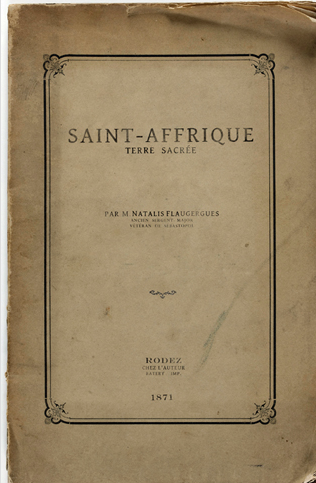Fous Littéraires: Some examples from a non-cannon — No. 2
Natalis Flaugergues (1823–1893)

Another beloved early literary eccentric now firmly established in the roll call of fou, though he was not included in Queneau and Blavier’s research, is Natalis Flaugergues (1823-1893). Natalis's father worked as an itinerant merchant, and he himself, after a period in a seminary, pursued a military career until a severe head wound in the Battle of Meleganano (Italy) brought it to an abrupt end. After this he seems to have devoted himself mainly to writing and research, though unlike some other well-known fou, Natalis was not wealthy. However, a relative, Pauline Flaugergues, was both a writer and confident of Georges Sands. Aside from his stint in the army Flaugergues lived in and around the city of Rodez where Artaud would later be confined. (When reading of the lives and work of fou, it is hard not to feel that this really is an under-recognized strand of modern literary history.)
Though Flaugergues travelled widely as a soldier, Rodez and its environs would play the key role in his thought, explicated in two volumes; Saint-Afrique, sacred ground (1871), and De l’origine Ruthénoise des Atlantes et autre peuples de la terre,” (or The Ruthénoise origin of Atlantis and the other peoples of the earth), (1874). In preparation for these works Flaugergues spent much time pursuing historical, philological and etymological research, and his work draws upon, and elaborates themes already present in both Gaelic and English lore. (See https://fr.wikipedia.org/wiki/Natalis_Flaugergues )
Natalis Flaugergues (1823-1893) Saint-Affrique - cradle of humanity
Saint-Affrique is a small town about 80 kilometers south of Rodez, in the Aveyron region of Southern France. It sprang up in the 6th century around the tomb of St. African, Bishop of Comminges, and its possession was often vigorously contested. The key point for Flaugergues is the legend that Joseph of Arimathea took the Holy Grail to Aveyron after Christ's resurrection, where Flaugergues believed it remained to his day. (This piece of lore is also linked to the holy quest of Arthurian legend.) Flaugergues sought by various means to prove this point in his book, however, the only response was a brief notice in the annual report of the League of letters, arts and sciences of Aveyron which, while calling it a "bold assumption [with a] laudable goal," nevertheless considered its findings unsubstantiated, (https://fr.wikipedia.org/wiki/Natalis_Flaugergues).
Undetered Flaugergues continued, producing his second book in 1874, in which is elaborated the even bolder thesis that Rodez is the center of the world and the cradle of humanity, its inhabitants being the post-Edenic ancestors of all the peoples of the Earth, and its dialect, Rouergat, the Ur tongue from which all (non-divine) languages derive. Here is the source of Flaugergues's fascination for later scholars, for like many fou, his research methods are mainly etymological and philological, rather than what we would today regard as strictly historical. (It must be remembered however, that in the 19th century philology was widely considered a profound and serious source of historical knowledge.) In support of his own argument, Flaugergues cites the scholar Jacques Le Brigant who, in The Primary Language Preserved, argued that both Chinese and Sanskrit, as well as the languages of the Caribbean and Tahiti, all have their roots in Celtic; and Francisque Michel, who in 1857 proclaimed Basque the origin of all Semitic languages. Alongside the philological arguments, Flaugergues also analysed local place-names to support his points. For example, according to Flaugergues, the name of the hamlet of Vailhauzy, part of the municipality of Saint-Affrique, takes its name from a deformation veille aussi (Eve too!). Something similar can be said for the name of another village, Monhargues, allegedly derived from Monarque. In Flaugergues’s analysis both place names allude to the divine status of Christ, and demonstrate an indexical link between the region and His divine presence.
The revelation of the central position of Rodez, specifically its Cathedral, was unveiled to Flaugergues during his years in the seminary. Here is how he describes the communication:
"[...] During the evenings spent in the seminary of Villefranche, I studied tirelessly countless similarities that the Hebrew language, Asian and Anglo-Saxon could have with Rouergat. Rolling words, grammar, primitive syllables, everything was undeniably linked. [...] I had a revelation during a night spent in prayer on the floor of the church Notre-Dame-des-Treize-Pierre, adjacent to the seminary. [...] A voice said to me, beware of false prophets who claim that Jerusalem is the center of the world [...] and never forget:
A Rodez, the cathedral,
The world is the pedestal.
If misfortune happens to him,
Request Saint-Amans and Saint-Yves.
[...] The silence accompanying the publication of this second volume seems to have been total," (https://fr.wikipedia.org/wiki/Natalis_Flaugergues).
Three elements in Flaugergues’s approach are key to students of fou:
1)- the fact that language does not provide merely a medium for re-presenting the world, but is itself a source of profound knowledge about reality,
2)- the fact that words are often not merely "arbitrary" collections of letters or phonemes, but have a motivated relationship to the aspects of reality they reference,
3)- a sense that what is revealed in language has the status of a compelling "truth” whose reality is independent of the tongue in which it is uttered.
All these are complete anathema to standard contemporary theories of language and, as we shall see, precisely because of this, fou texts can, and indeed have become the core pre-texts for the development of a wholly different theory of language, as well as a vastly different way of understanding the relations between language and other aspects of the world, including thought, the body, and dare I say it, the "subject.
Fous Littéraires: Mad linguists and other literary fools